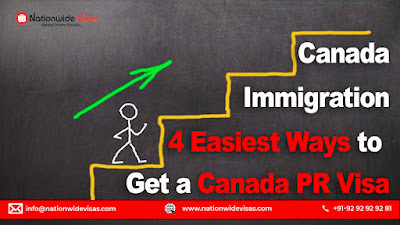The easiest way to get a Canada PR Visa majorly depends on your unique profile and connections to the country. With the Canadian immigration targets higher than ever, now is the best time to start your Canada immigration journey.
In this write-up, we’ll be going through the top 4 easiest pathways to secure a Canada PR Visa in 2022.
It should be noted that although some programs might be easier for you to apply to, the process is quite long and involves many steps. There’s no denying the fact that the Canada immigration process requires a significant amount of financial and emotional investment – but the end results are worth it.
At present, Canada ranks among the best immigration destinations offering a high quality of life, world-class education, public healthcare, better-paid job opportunities, and much more.
Here are the 4 easiest pathways for foreign immigrants to apply for a Canada PR Visa in 2022.
 |
| Canada Immigration: 4 Easiest Ways To Get A Canada PR Visa |
4 Easiest Ways To Get A Canada PR Visa
Express Entry System
Ever since its inception back in 2015, the Express Entry System has become immensely popular amongst immigrants from across the world. Thanks to its lenient application process – it is one of the fastest ways to secure a Canada PR Visa. Applications under the Express Entry are usually processed in under 6 months.
Applications under this program are evaluated under a point-based tool known as the Comprehensive Ranking System (CRS). The final CRS score assesses Canada immigration applications based on human capital factors such as age, education, work experience, language proficiency, adaptability, and spousal sponsorship.
There are three sub-streams managed by the Express Entry system:
Federal Skilled Workers Program (FSWP)
Federal Skilled Trades Program (FSTP)
Canadian Experience Class (CEC)
Provincial Nominee Program (PNP)
Provincial Nominee Program (PNP) is the second leading way to immigrate to Canada as a skilled worker after Express Entry. Canada grants the rights to its provinces by nominating and inviting skilled immigrants based on the in-demand occupation to meet the labor market shortages in that province. There are two ways to obtain a provincial nomination – either through an Express Entry linked PNP or by applying directly to the province. A provincial nomination guarantees an Invitation to Apply (ITA) – as it rewards the applicant with additional 600 points to their final CRS score.
Some of Canada’s most popular Provincial Nominee Programs include:
Alberta Advantage Immigration Program (AAIP)
British Columbia Provincial Nominee Program (BC PNP)
Manitoba Provincial Nominee Program (MPNP)
New Brunswick Provincial Nominee Program (NB PNP)
Newfoundland and Labrador Provincial Nominee Program (NL PNP)
Nova Scotia Nominee Program (NSNP)
Ontario Immigrant Nominee Program (OINP)
Prince Edward Islands Provincial Nominee Program (PEI PNP)
Saskatchewan Immigrant Nominee Program (SINP)
Yukon Nominee Program (YNP)
Business Investor Programs
Canada welcomes successful business people who are seeking new opportunities and challenges. The Business Immigration Program is designed to encourage and facilitate the admission of these individuals. Both the federal and provincial/territorial governments welcome business immigrants and offer services to help immigrants start a business and settle in Canada.
Some of the easiest business investor programs in Canada include:
Self-Employed Visa
PNP Entrepreneur Visa
Business Visitor Visa
Work Permit With A Job Offer
If you are a skilled worker and have managed to acquire a valid job offer from a Canadian employer – you may very well be eligible to apply for a Canada PR Visa. A job offer must meet certain requirements to be considered valid for certain work permit applications. In most cases, in order to be eligible for a work permit, an applicant’s job offer must be either:
Supported by a positive Labour Market Impact Assessment (LMIA); or
Exempt from requiring an LMIA.
Benefits of Getting A Canada PR Visa
 |
| Benefits of Getting A Canada PR Visa |
Here are 5 of the major benefits you’ll experience once you earn a Canada PR Visa:
You can live and work anywhere in Canada
You will be able to live and work in any part of the country! You have every right to move if you start out in Manitoba but find a better job in British Columbia. Permanent residents are not bound to a certain employer or province.
You have universal access to healthcare and social services
Canada's healthcare and social services are available to all permanent residents. Because healthcare in Canada is universal, you will have access to free medical treatment!
You can sponsor your spouse and children
You can seek to sponsor your spouse, common-law partner, and dependent children to join you in Canada once you have become a permanent resident. However, if you apply for Canada immigration through Express Entry, you can include your family in your first application and avoid having to sponsor them afterward.
Your children will be able to study for free
Children of permanent residents of Canada are entitled to free education until they reach secondary school. After graduation, permanent residents can attend post-secondary school at a lower cost than international students.
You can become a Canadian citizen
The first step toward becoming a Canadian citizen is to become a permanent resident. You'll be able to become a citizen if you've lived in Canada for three out of the last five years!

